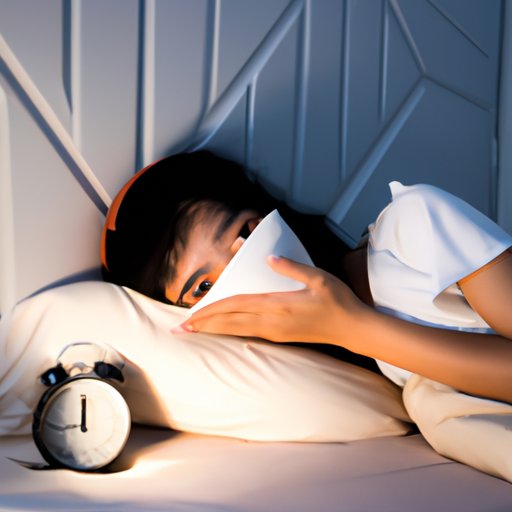Introduction
It’s a common belief that getting enough sleep is essential for good health and well-being. But what happens if you get too much sleep? Does sleeping too much make you tired? In this article, we explore the relationship between sleeping too much and feeling tired, as well as the potential health risks associated with oversleeping.
Definition of Oversleeping
Oversleeping is defined as sleeping for an extended period of time beyond what’s considered healthy or necessary. The amount of sleep needed varies from person to person, but on average, adults should aim for 7 to 9 hours of sleep per day. Anything over 10 hours is considered excessive and can be linked to feelings of fatigue and low energy.

Overview of Relationship Between Too Much Sleep and Tiredness
Many people assume that more sleep means more energy, but this isn’t necessarily true. In fact, sleeping too much can have the opposite effect and leave you feeling sluggish and unmotivated. It’s important to understand the relationship between sleeping too much and tiredness in order to maintain healthy sleep habits.
Examining the Relationship Between Sleeping Too Much and Fatigue
Effects of Oversleeping on Energy Levels
When it comes to feeling energized and alert, the quality of your sleep matters just as much as the quantity. If you’re sleeping too much, it could mean that your sleep cycles are thrown off, which can lead to feeling groggy and unproductive during the day.
In addition, when you sleep too much, your body doesn’t get the same restorative benefits as it would from a regular night’s sleep. This can lead to feeling fatigued and unmotivated throughout the day.
Link Between Sleep Duration and Tiredness
Studies have shown that there is a link between sleep duration and tiredness. People who sleep too much (more than 10 hours per night) are more likely to report feelings of fatigue and low energy compared to those who get a regular amount of sleep (7-9 hours).
How Much Sleep is Too Much?
Understanding the Impact of Excessive Sleep on Alertness
It’s important to understand the impact of excessive sleep on your alertness and energy levels. While some people may need more than 10 hours of sleep per night, it’s generally not recommended for most adults.
If you’re consistently sleeping more than 10 hours at night and still feeling tired during the day, it may be a sign that your sleep quality is poor or that something else is going on. It’s important to speak to your doctor if you’re concerned about your sleep habits.
Debunking the Myth: Does More Sleep Mean More Energy?
Contrary to popular belief, more sleep does not necessarily mean more energy. In fact, sleeping too much can have the opposite effect and leave you feeling sluggish and unmotivated during the day. It’s important to find the right balance between getting enough sleep and not sleeping too much in order to feel energized and alert.
Is Sleeping Too Much Bad for Your Health?
Potential Long-Term Risks of Oversleeping
While occasional oversleeping may not have long-term effects, chronic oversleeping can be linked to a number of health issues. Studies have shown that people who consistently sleep more than 10 hours per night are at an increased risk of developing heart disease, diabetes, obesity, depression, and other health problems.
Conclusion
In conclusion, it’s important to understand the relationship between sleeping too much and feeling tired. While getting enough sleep is essential for good health and well-being, sleeping too much can actually have the opposite effect and leave you feeling sluggish and unmotivated. Additionally, chronic oversleeping has been linked to a number of health issues, so it’s important to find the right balance between getting enough sleep and not sleeping too much.
Summary of Findings
We explored the relationship between sleeping too much and feeling tired, as well as the potential health risks associated with oversleeping. We found that while getting enough sleep is essential for good health, sleeping too much can actually have the opposite effect and leave you feeling sluggish and unmotivated. Additionally, chronic oversleeping has been linked to a number of health issues.
Recommendations for Healthy Sleep Habits
To maintain healthy sleep habits, it’s important to find the right balance between getting enough sleep and not sleeping too much. Most adults should aim for 7 to 9 hours of sleep per night, and anything over 10 hours is considered excessive. If you’re consistently sleeping more than 10 hours at night and still feeling tired during the day, it may be a sign that something else is going on and it’s important to speak to your doctor.


